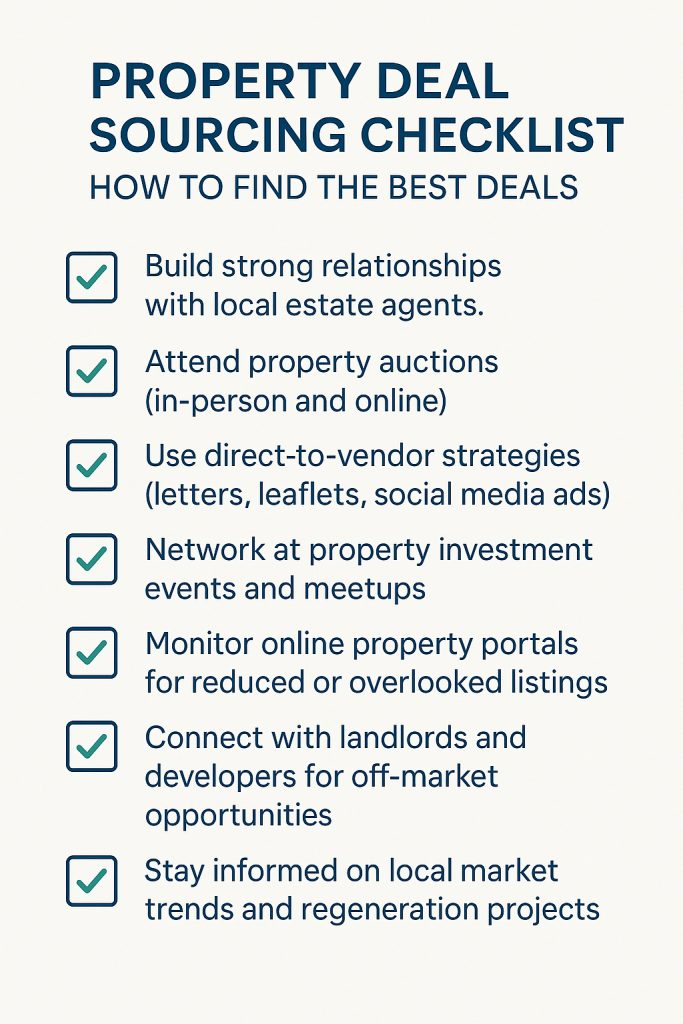At RCCIL, we believe that knowledge is the foundation of success in property investment. One of the fastest-growing and often misunderstood sectors is property deal sourcing. This guide aims to demystify deal sourcing and help you take your first steps clearly and confidently.
Whether you are looking for an entry point into property or want to generate income by connecting investors to lucrative opportunities, this guide will offer practical steps and real-world examples to help you get started.
What is Deal Sourcing Property?
Deal sourcing property is identifying and securing investment opportunities and offering them to investors in exchange for a fee. Rather than purchasing the property, deal sourcers act as trusted intermediaries who find below-market-value deals, high-yield rental opportunities, or properties with development potential. They carefully package each opportunity with detailed analysis, enabling investors to make informed decisions quickly. Successful deal sourcing is built on market knowledge, strong networks, and due diligence, delivering value to motivated sellers and investors seeking profitable portfolio additions.
Q: What does ‘deal sourcing property’ mean?
A: Deal sourcing property refers to identifying, securing, and offering property investment opportunities to other investors. These opportunities are typically sourced below market value (BMV) or offer unique angles such as development potential, high rental yields, or portfolio expansion benefits.
At its core, deal sourcing involves:
• Researching and finding investment-worthy properties.
• Negotiating purchase prices and terms.
• Packaging the deal with relevant information (financials, area analysis, projected returns).
• Offering the deal to interested investors in return for a sourcing fee.
Example: A sourcer might find a 3-bed house in Liverpool listed for £100,000 where similar properties sell for £120,000. After negotiating a purchase price of £95,000 and packaging the deal showing a potential 10% yield, the sourcer offers the deal to a buy-to-let investor for a fee of £3,000.

What is Property Deal Sourcing (Explained Further)?
Q: How is property deal sourcing different from general property investing? A: The key difference is ownership vs facilitation. A deal sourcer does not typically buy the property. Instead, they act as the connector between motivated sellers and property investors. Their role is to:
• Build relationships with agents, developers, landlords, and off-market contacts.
• Understand and match investor requirements (yield, location, asset class).
• Conduct due diligence to ensure deals are sound and risk is minimised.
Sourcing is a business and can be very lucrative when done ethically and compliantly.
Example: An investor may seek HMOS in Manchester that deliver 12% ROI. The sourcer, knowing local agents and monitoring auction results, finds a suitable property, verifies legal packs, estimates refurbishment costs, and offers the packaged deal to the investor, ready for decision-making. Learn how to get into property with the RCCIL guide.
How to Get Into Property Deal Sourcing
Getting into property deal sourcing requires a mix of education, networking, and regulatory compliance. Start by learning the fundamentals of property investment and deal analysis through courses and industry research. Next, focus on building a strong network of estate agents, landlords, and investors. Relationships are key to accessing quality deals.
Q: How do I start a career or business in deal sourcing?
A: Getting started requires preparation, knowledge and compliance.
Here are the key steps:
1. Educate Yourself:
Understand property investment fundamentals, including rental yields, ROI, and property cycles. Learn about sourcing regulations (you must comply with The Property Ombudsman, Anti-Money Laundering (AML) requirements, and possibly become registered with HMRC). We also recommend working with reputable companies, such as Total Property Group.
Example: Completing an online course on property sourcing and joining relevant professional bodies helps build credibility and know-how.
2. Build a Network:
Develop relationships with estate agents, auction houses, landlords, and developers.
Network with potential investors to understand their buying criteria.
Example: Attend local property networking events and build rapport with agents who can tip you off about motivated sellers before properties hit the market.
3. Find Deals:
Use online platforms, auctions, direct-to-vendor marketing, and local area research.
Example: Running a leaflet campaign in landlord-heavy areas can discreetly uncover landlords looking to offload portfolios.
4. Package Deals Professionally:
Create clear and concise deal packs showing ROI, comparables, location analysis, and exit strategies.
Example: Your deal pack should include photos, floor plans, local rental demand stats, cash flow projections, and solicitor details to make it investor-ready.
5. Market to Investors:
Build an investor list (email, LinkedIn, property forums).
Present opportunities ethically and transparently.
Example: Offer free webinars or investor guides to grow your database and keep them engaged with regular deal alerts.
6. Stay Compliant:
Join a redress scheme (The Property Ombudsman or PRS).
Register for AML supervision (HMRC).
Have proper contracts and NDA’s in place.
Example: Ensure all investors sign NDA’s before viewing deal packs, protecting your sourcing efforts and maintaining confidentiality.
Q: Do I need money to start deal sourcing?
A: Starting costs are relatively low compared to traditional property investment.
However, you will need funds for:
Registration and compliance fees: learn more on the Law Society’s property compliance resource.
Marketing (website, social media, property software).
Education (training and mentoring can help fast-track your success).
Example: Establishing a professional website and LinkedIn profile, joining a property redress scheme, and taking basic AML training could cost around £1,000 to £2,000.
What Factors Need to Be Considered During Property Deal Analysis?
When analysing any property deal, it’s essential to take a comprehensive and balanced view to ensure the opportunity meets both investor objectives and risk appetite. Key factors include the property’s location and local demand, current market value compared to sold comparables, potential rental income and yield, and the full cost of acquisition, refurbishment, and ongoing maintenance. Additionally, consider exit strategies — will the investor hold, refinance, or resell the property?
A thorough analysis highlights profitability and uncovers hidden risks, ensuring you package attractive deals that are realistic and aligned with market dynamics.
Q: What should be assessed when analysing a property deal?
A: Successful deal sourcing depends on thorough analysis. Consider the following factors:
• Location: Proximity to amenities, transport links, and demand in the area.
• Market Value: Compare against sold prices and market trends.
• Rental Potential: Expected rental income and void periods.
• Costs: Refurbishment, legal, finance, and ongoing maintenance.
• Exit Strategies: Potential resale, refinance, or long-term hold.
Example: A property in a regeneration area may offer future capital growth, while one near universities might be ideal for student lettings.

What Are the Pros and Cons of Property Deal Sourcing?
Q: What are the advantages and challenges of deal sourcing?
Pros:
• There is a low barrier to entry compared to buying property.
• Ability to generate quick cash flow via sourcing fees.
• Flexibility to work from anywhere.
• Helps investors scale portfolios without heavy lifting.
Cons:
• Highly competitive market.
• Strict compliance requirements.
• Income can be inconsistent.
• Building trust and a reputation takes time.
Example: While sourcing fees can range from £2,000 to £5,000 per deal, sourcing is relationship-driven, and you may need months of networking before securing your first deal.
What Qualifications Do I Need to Be a Property Deal Sourcer?
While no formal academic qualifications are required to become a property deal sourcer, you must meet significant legal and compliance obligations. This includes registering with a government-approved property redress scheme (such as The Property Ombudsman or PRS), obtaining Anti-Money Laundering (AML) supervision through HMRC, and registering with the Information Commissioner’s Office (ICO) for data protection. Recognised property sourcing and compliance training with companies such as Quality Investment Properties is highly recommended to build credibility and ensure you operate legally and professionally. Developing additional sales, negotiation, and property investment market analysis skills will further enhance your success in the industry.
Q: Do I need any formal qualifications to start sourcing?
A: There is no legal requirement for formal qualifications, but professional training and compliance are essential:
• Mandatory: Registration with a property redress scheme, AML registration (HMRC), and data protection registration (ICO).
• Recommended: Property sourcing and compliance training courses.
• Optional but Valuable: Sales, negotiation, and property investment courses.
Example: Completing a sourcing compliance course ensures you understand legal obligations, protecting you and your investors.
How Can I Find the Best Property Deals?
Finding the best property deals requires a proactive and multi-channel approach. Successful sourcers combine strong relationships with estate agents, auctioneers, and developers with direct-to-vendor strategies such as targeted letters or online ads. Off-market opportunities often yield the best returns, so networking at property events and leveraging investor communities is essential. Additionally, monitoring online portals for price reductions or overlooked listings can uncover hidden gems. By staying active, informed, and connected, you’ll position yourself to secure valuable deals ahead of the competition.
Q: Where do successful sourcers find high-quality deals?
A: Effective sourcing combines multiple strategies, such as:
• Estate Agents: Build rapport for early access to listings.
• Direct-to-Vendor: Use letters, leaflets, and online ads.
• Auctions: Spot undervalued or distressed properties.
• Networking: Attend property events and join online groups.
• Online Platforms: Monitor portals for overlooked or price-reduced properties.
Example: A sourcer who regularly attends auctions and networks with estate agents will often hear about off-market deals before they are advertised to the public. Learn more about some of the best ways to invest £100k in our guidebook.
Final Thought from RCCIL
Deal sourcing is an exciting gateway into property. At RCCIL, we always emphasise the importance of doing it right. This means acting ethically, being transparent, and prioritising investor trust and legal compliance above all else.
When done correctly, deal sourcing can generate significant income, help property investors grow portfolios strategically, and establish you as a respected professional in the property community.
If you are ready to explore property deal sourcing further or want tailored advice on starting your sourcing journey, contact RCCIL today. We’re here to support the next generation of smart property professionals.
Other Useful Guides:
